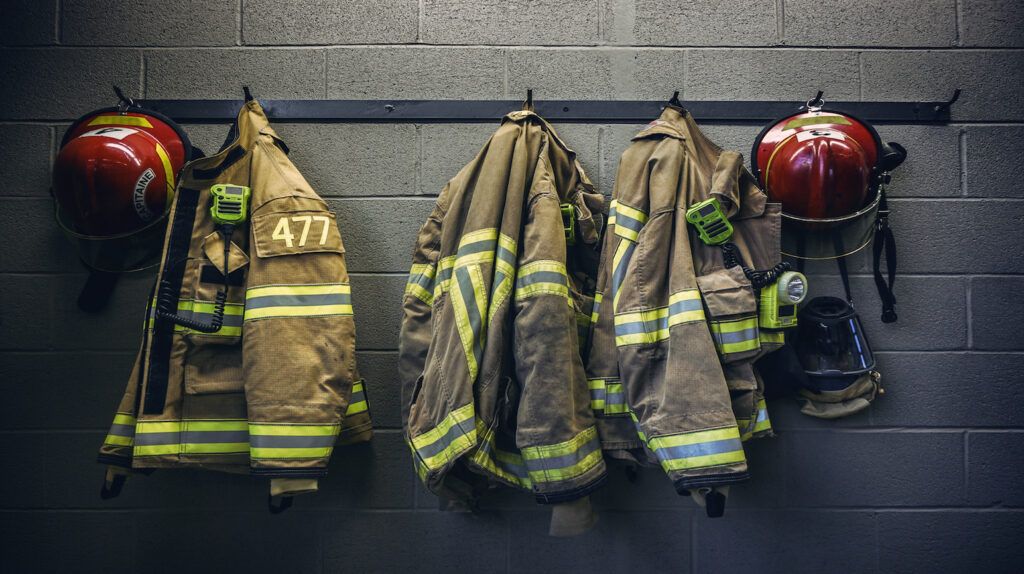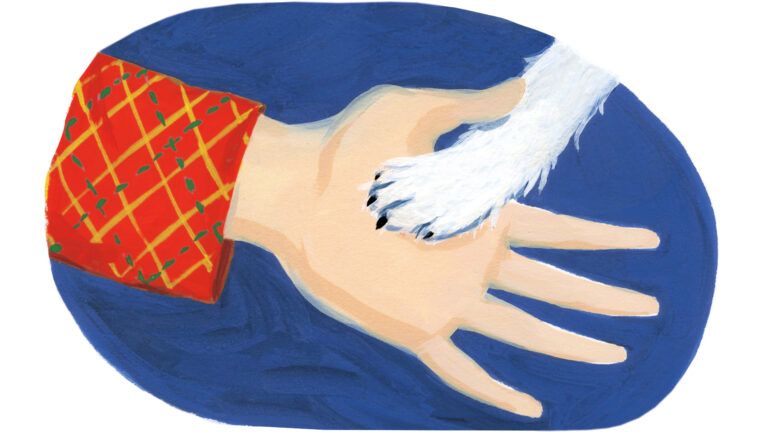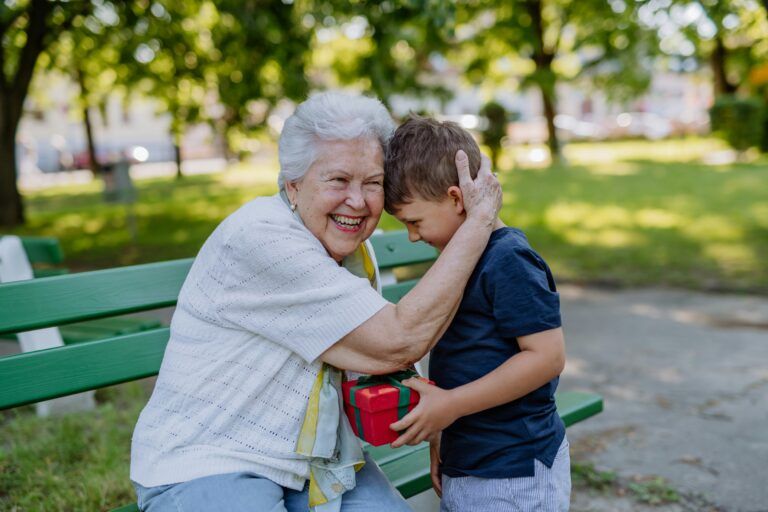We ate a big breakfast at a local restaurant, like we did every Father’s Day. Then off to church. Pastor talked about how God is a father who never lets his children down. I wanted to be a father like that.
One of the presents my daughters gave me was a T-shirt emblazoned with the words “World’s Coolest Dad.” That was good enough for me.
After church I put the shirt on. Then we’d leave for a car show the next town over. That was also our tradition. Just like any other Father’s Day. That’s what made it so great.
GET THESE BOOKS FOR THE FATHERS YOU LOVE
Just as we headed out the front door my volunteer fire-department pager went off. Nuts, I thought. Maybe it’s just a brush fire and they won’t need me.
But the dispatcher’s voice crackled: “Attention, Pocahontas-Old Ripley firefighters! House fire on Simpson Street. Repeat. House fire on Simpson Street.”
“Gotta go,” I said. I left my family on the front porch, ran to my car, jumped behind the wheel and took off. Again the dispatcher’s voice: “There is a child inside. Repeat. A child is trapped inside the house.”
I drove to the firehouse, all the while hoping it would just be a false alarm. That happens a lot. We’d get to a house fire and find everyone standing outside in the yard, safe.
I got to the firehouse in minutes. Another firefighter, Tom Smith, and the chief were waiting. “Tommy, Don, take truck two-five-three. Roll!” he ordered. “The rest of the guys will be right behind you.”
Tommy and I threw on our fire-retardant clothes and boots. “What do you think?” Tommy asked.
“False alarm, maybe?” But it was more of a hope than an opinion.
Tommy and I rolled in truck 253, siren ripping through the otherwise peaceful Sunday afternoon. As the first on the scene, our job was to make sure everyone was out of the house, locate the nearest hydrant, then wait for backup.
And there was another backup. Prayer. I always pray before going in to a fire. ‘
The truck screeched around the corner onto Simpson. A small crowd had gathered in front of number 907. They appeared agitated, almost panicky. Smoke billowed from the one-story house’s open front door. Tommy grabbed the radio.
“Truck two-five-three on scene. Advise all units: We have smoke; this is a working fire!”
We lurched to a stop. The bystanders swarmed us. “The baby’s inside!” one yelled. “Do something, quick!”
First Tommy and I had to put on our air packs. We wouldn’t stand a chance without oxygen. Someone—a neighbor, I figured—stood in the doorway of the house holding a garden hose, a pathetic jet of water spurting in vain.
A large man burst through the door, sputtering and coughing, red eyes streaming with tears. “Please hurry!” he called. “My boy’s still in there. I couldn’t get to him!”
Tommy and I glanced at each other. I knew what he was thinking. No time to wait for backup. Together we raced toward the house. We heard a voice behind us. Battalion Chief Steve Brown was on scene. Backup would be here soon.
Steve yanked the garden hose from the neighbor and headed inside. “Let’s move,” he said.
Tommy and I plunged through the doorway. Curtains of fire ate away at the walls and ceiling. The place was an inferno. And all we had was a garden hose. That wouldn’t cut it.
Lord, I begged, please get those other firefighters here on the double. Please shield us from the flames and lead us to that child. Please don’t let us die. Especially not today.
Tommy and I worked as a pair. We got down on all fours. Every few seconds I reached out to touch Tommy or I felt him touch me. Maintain contact, I reminded myself. That’s one of the first rules.
Trying to find Tommy if I lost him would mean a delay, possibly death. For me, for Tommy, for the child in the house.
The smoke quickly grew thicker until it was pitch-black. One thing you don’t realize about a fire until you’re in one is how loud the sound is. Flames roared in our ears. Pieces of ceiling smashed down on our backs. Ashes everywhere. The blistering heat sucked sweat from our skin.
“Anyone here?” I shouted. No answer. Tommy and I searched every inch of the first two rooms. No child. My hand knocked into a wall. We followed it down a hallway. I strained to see something through the smoke. Couldn’t make out what it was, so I reached for it.
A table leg. Then a chair. Must be the dining room. Tommy and I felt all around under the table. Again nothing. “Next room!” I shouted.
I knew the layout of these houses. The only room left was the kitchen. We crawled from one end of it to the other.
Flames roared louder. How long before the roof collapses? “This is it!” I yelled to Tommy. “We have to get out!”
All at once a vision was put into my head—that father begging us to save his child. We couldn’t give up. Not today, I thought again. There still might be a chance.
All right, Lord, I prayed. Pastor said this morning that you’ll never let your children down. Well, there’s a little boy somewhere in here who needs your help. And so do I.
I tapped Tommy on the arm and motioned him to follow. “Let’s try here!” I shouted. I reached out. Thick black smoke flowed through my empty fingers. Then my hand landed on something. Another chair leg? No. Too thin.
I squeezed gently. Soft. It felt like…an arm. “Tommy, I’ve got him! I’ve got him!”
I snatched the boy up in one arm and frantically waved ahead of me with the other, half crawling, half crouching. Stay low. Move fast. My breathing was a roar inside my fire hood. Sweat blinded me. Didn’t much matter. I couldn’t see anyway.
Tommy kept close behind, tapping me again and again. I was out the front door before I could make out a glimpse of daylight. I stood up and ran with the boy to a safe distance. I put him down on the lawn. His face gray, his body limp, his chest still. Couldn’t have been more than two years old.
I tore off my mask and started mouth-to-mouth.
Breathe! Finally he sputtered and took a breath. Then another. Slowly color rose in his face. Our EMTs started him on oxygen and loaded him into our ambulance. It looked like he would be fine.
Once the fire was under control, Tommy and I stripped off our gear and sat in the shade of a maple, drinking ice water a neighbor had given us. I looked down at myself. I still had on my “Coolest Dad” T-shirt. Filthiest dad was more like it. Those black stains would never come out.
“Look at this,” I said out loud. “You can hardly see what it says anymore.”
The neighbor who’d given us water just smiled. “That’s okay,” he said. “Today you guys gave another dad the greatest gift anyone ever could.”






